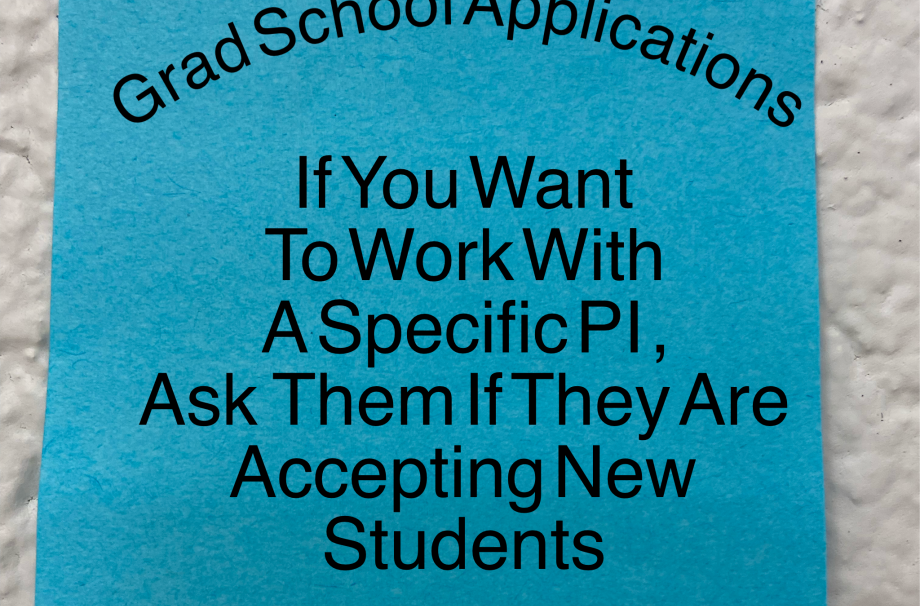Grad School Applications: When You're Interested in a Specific Lab Ask the PI if They Are Accepting New Students
Grad School Applications: When You're Interested in a Specific Lab Ask the PI if They Are Accepting New Students
Question: Is a specific PI is accepting new grad students this cycle?
Solution: Contact the PI directly.
If you want to work with a specific PI, then you need to know if they are accepting new grad students for the degree program you’re pursuing (MS or PhD). If this wasn't obvious to you don't worry because many undergrads on the path to grad school have asked for advice on this subject.
One misunderstanding students sometimes have is that they will automatically become a member of a specific research group once they are admitted to grad school. Another misunderstanding is that it’s ultimately their choice of which research group they join after starting grad school. From undergrads who have asked us about the lab selection process in grad school, we think these misunderstandings are often rooted in an interpretation of others’ experiences. Because in some cases, a new grad student does join a specific lab right away—and it’s often a research group that they specified at application stage. But there are other possibilities as well.
For instance, a PI may not be accepting new graduate students in the current cycle or incoming students might be required to do rotations in multiple groups before they choose, and are chosen by, a lab for the duration of their grad program. So, if you're applying to a specific grad school because you want to work with a specific PI then you need to find out if that’s even a possibility as soon as you can.
Many PIs encourage potential grad students to contact them during the application process. From our admittedly unscientific polls on Twitter during Grad Recruit Week in STEM, personal opinions, and feedback with colleagues, when a PI prefers someone to contact them varies. Some PIs prefer a student connects with them before submitting their application and other PIs would rather the student waited until they’ve been accepted by the graduate school. However, we haven't yet been informed by a PI that they would be bothered by a candidate who contacted them too early.
If you’re interested in joining a specific lab, contact the professor to find out if they are taking new grad students in the current cycle. If they are, they may ask to schedule a virtual chat with you to discuss why you’re going to grad school, your undergrad research experiences, your career goals, and why, specially, you’re interested in joining their research group. In many cases, the PI can serve as your ally to the admissions committee. And in some departments, only those students who have a “faculty sponsor” will be admitted.
But this conversion with a potential PI is also an important opportunity for you to interview them . Whether you meet virtually, connect through email, or use a combination of the two, the conversation(s) with a prospective PI should be enlightening on several aspects. This is the the time to get to know them as well as you can without being a group member and learn about their expectations and how your grad school experience would be shaped by working with them.
You might ask about funding, their mentoring or management style, their expectations for grad students, and for contact information of current or former group members. (Many PIs will also volunteer contact information on former or current lab members but they might also refer you to a alumni page on their website for former members and the university directory for current members. This isn't being unhelpful as they still are giving you easy access to the information you need.)
